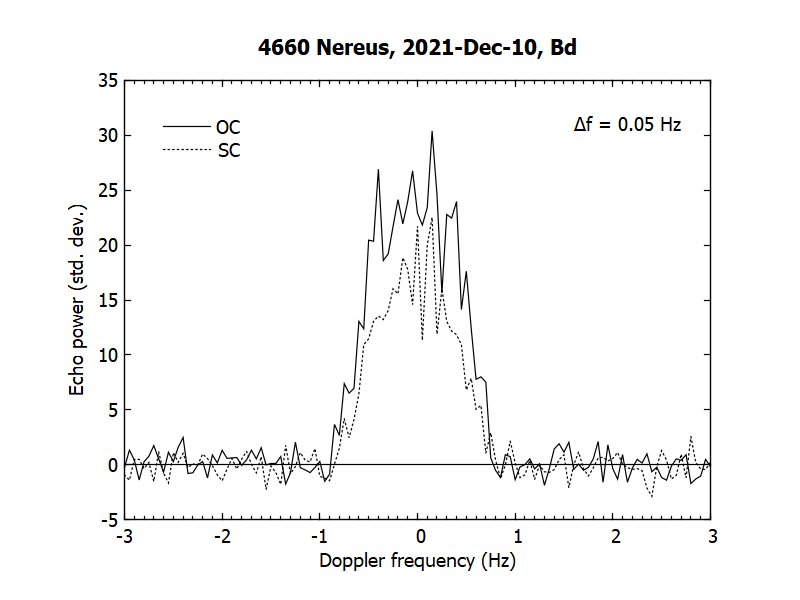4660 Nereus
Discovered on February 28, 1982 by Eleanor F. Helin using the 18-inch Schmidt camera at Palomar. Included in the list of the "Potentially Hazardous Asteroids" of the Minor Planet Center.
Orbital and Physical Characteristics
| Epoch | 2022 Jan 21 |
| Mean Anomaly | 7.32549° |
| Argument of Perihelion | 159.54239° |
| Longitude of Ascending Node | 313.15230° |
| Inclination | 1.45397° |
| Eccentricity | 0.3589359 |
| Semimajor Axis | 1.4855481 AU |
| Orbital Period | 1.81 years |
MOID |
0.004 AU |
| Orbit type | Apollo |
| Absolute Magnitude | 18.35 |
| Diameter | ~330 m [1][2] |
| Rotation period | ~15.1 h [3] |
Radar scattering properties
SC/OC |
0.65 [4] |
| Radar albedo | 0.38 [4] |
Close Approach to the Earth
| Date of encounter | 2021 Dec 11 | |
| Distance | 0.02630 AU (10.23 lunar distances) |
Observation Schedule
| Date | Window, UT | Receiver |
Transmitter |
Frequency, MHz |
λ, cm |
Ptx, kW |
R, au |
RTT, sec |
SNR/RTT |
|---|---|---|---|---|---|---|---|---|---|
| 2021 Dec 4 | 10:30 - 12:25 | РТ-32 (Sv, Zc, Bd) | DSS-14 [5] | 8560.0 | 3.5 | 440 | 0.03772 | 38 | 7 |
| 2021 Dec 8 | 06:20 - 09:00 | RT-32 (Sv, Zc) | DSS-14 [5] | 8560.0 | 3.5 | 440 | 0.02893 | 29 | 19 |
| 06:20 - 12:00 | RT-32 (Bd) | ||||||||
| 2021 Dec 9 | 07:30 - 10:00 | RT-32 (Bd) | DSS-14 [5] | 8560.0 | 3.5 | 440 | 0.02758 | 28 | 22 |
| 2021 Dec 10 | 11:00 - 13:10 | RT-32 (Sv, Zc, Bd) | DSS-14 [5] | 8560.0 | 3.5 | 440 | 0.02659 | 27 | 25 |
Echo power spectrum
Bistatic DSS-14/RT-32 continuous wave echo power spectra of 4660 Nereus obtained at Badary observatory on December 10, 2021 from 12:45 to 13:05 UT. Solid and dashed lines denote echo power in the opposite circular (OC) and same circular (SC) polarizations as that of the transmitted wave. The obtained power spectra were used to estimate the сircular polarization ratio of ~0.65 as well as the radar albedo of ~0.38.

Remarks
Delbo et al., Keck observations of near-Earth asteroids in the thermal infrared. Icarus 166, 2003.
Brozovic et al., Radar observations and a physical model of Asteroid 4660 Nereus, a prime space mission target. Icarus 201, 2009.
Warner, B.D. et al., 2009.
Yu. S. Bondarenko et al., 2021.
We thank L. A. Benner, S. Naidu, M. Brozovic and the technical staff at Goldstone for the help with the radar observations.